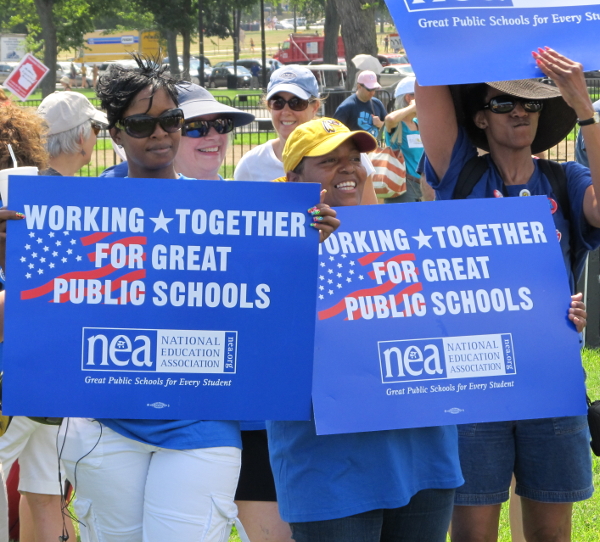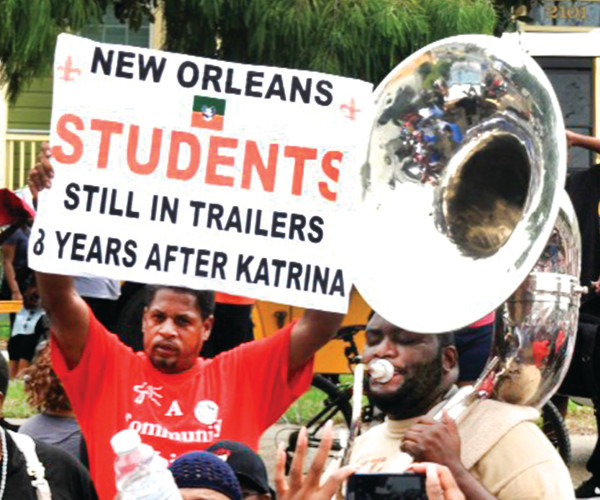
November 2013 & January 2014
New Orleans School Privatization
– a warning for us all

- New Orleans protesters at the Save our Schools March and National Call to Action, Washington DC. / PHOTO/DJ MARKEY
Editors Note: While mass public school closings,withpublic funds diverted towardprivate charter schools,isrelatively new to many cities, thishas been going on in New Orleans since Hurricane Katrina, eight years ago. A report entitled,“New Orleans Education Reform: A Guide for Cities or a Warning for Communities?” (Grassroots Lessons Learned, 2005-2012), berkeleyreviewofeducation.com/journal-issues.html, offers a glimpse into the future for the rest of the country. The People’s Tribune’s Joseph Peery, interviews DJ Markey, Director ofPyramidCommunityParent Resource Center in New Orleans, aleading advocate in the fight for equal quality education in Louisiana, and one of thecoauthors of the report mentioned above.
People’s Tribune: New Orleans is so important because of the number of schools that have become charters, and that they took advantage of Katrina to do it. It’s important that people know the lessons in your report.
DJ Markey: The report is something that we undertook because there has been so much misinformation put out. We tried to make the case that so called reform wasn’t doing what they were saying. New Orleans has become the first charter district in the country. Close to probably 85% of the students here are in charter schools.
PT: Tell us more about problems with corporate brand education.
DJ: The big thing going on is a by product of the privatization of public education. The first thing that goes is democracy. We still have the Orleans Parish School Board operating. But above that is the RSD (Recovery School District), the state entity establishedafter Katrina thatbasically took over most of the public schools. When the state came in and took over the system, they wanted to change everything. They wanted to get rid of the teachers unionand privatization became the vehicle they used. In the brochures that come from the Federal government, they all say that charter schools are public schools, but in reality they’re not, because they’re not run by the public. There was no real transition, there was a take over and installation of a private system that really doesn’t care about democratic principles. It is set up for profit and that’s about it. We work with kids with disabilities, and the plight of the kids with disabilities is outlined in the lawsuit by the Southern Poverty Law Center.The one thing we are sure about is thatkids with disabilities are short changed dramatically.
PT: What is the cause of the problem?
DJ: Katrina gave the state the opportunity. Its not like they hadn’t thought about it before. I think it’s obvious that in New Orleans the plan was to create charters and privatize the system, and the state legislature went after it. When we go back and look at it . . . especially in areas with high minority populations in the district, the schools were under resourced. You have high poverty in these schools. You certainly had all kinds of problems in them. But at the same time, privatization is not about education, it’s about somebody making a profit. The incentives, the money, all that is tied up in whatever school you seek to create here has to be a charter school to get off the ground.
>via: http://peoplestribune.org/pt-news/2013/11/new-orleans-school-privatization-warning-us/
Fight for quality education
in New Orleans

Commemoration in New Orleans of the 50th anniversary of the March on Washington. The event focused on stopping the violence, police brutality, Travon Martin, and public education. / PHOTO/TED QUANT
The People’s Tribune’s Joseph Peery interviewed DJ Markey, a leading advocate in the fight for equal quality education in New Orleans. This is part two of a two-part interview.
People’s Tribune: What’s the solution to what’s going on in education?
DJ Markey: Well, first we have to have a public conversation. The privatizers, like “New Schools for New Orleans” are the authors of the initial report to which we responded. Their focus is something quite different. That’s the one that says reforming schools in New Orleans is a model for the whole country to use. We know that’s not true. Schools must provide a 21st Century education for all children, including children with disabilities and with language differences. Returning schools to local control would be an important first step. The majority of the schools here are run by private boards and are not elected by anybody in the city. Public funds are expended and that’s the only connection we have with calling it public education. Under this arrangement, the tax paying public does not govern these schools.
PT: Local communities are up against a national strategy. If this can be done in the interest of the rich, why can’t we do the same thing in our interest?
DJ: That’s an interesting conversation. We have been having it here for some time. We have what’s called the Minimum Foundation Program. It’s the way education is funded. Governor Bobby Jindal has been taking the money directly out of this program to fund his voucher program. If you follow the money, you see that undercutting public education in this way does not portend well for the future. When you look around the country at areas where public schools are being charterized, you see lots of poor kids and lots of kids of color affected by school closures. You don’t have charter schools so much in rural areas; privatizers have gone after major urban centers. The policies coming out of Washington DC have assisted those entities seeking to privatize public education, so it is a national effort. More people are becoming aware that this is not in the long-term best interest of public education.
PT: How can we fund education in a more fair and equitable way for our children?
DJ: As far as policies coming out of the Federal government, there is no incentive to address equity. Re-prioritizing public education by taking money from the military budget to fund real change should be an important topic for our public conversation. We need more teachers, schools, programs, support for all kids to break the school to prison pipeline, more counselors and social workers. This will require more investment, especially from the federal government. We’re still struggling with those ideas. In New Orleans, when we talk about rebuilding schools, the question is always: Who will run them? How will they impact the community? What’s will be taught? Will the quality of life for the kids in this community be better? Is it going to bring communities back together? Those questions are unanswered. Bringing communities around the country together in a different way to demand something different from the federal government is what it will take.
>via: http://peoplestribune.org/pt-news/2014/01/fight-quality-education-new-orleans/
